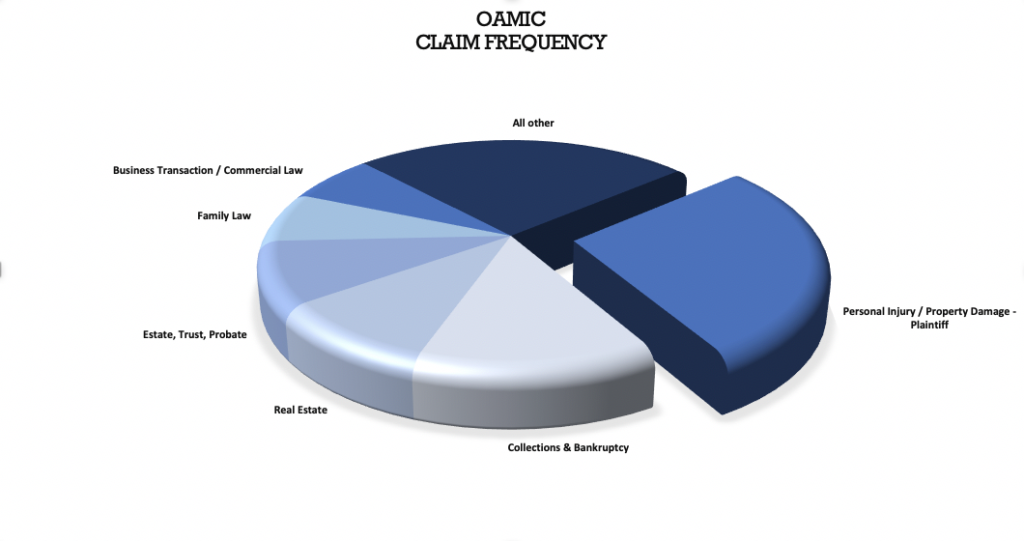
Personal injury/property damage – plaintiff is the area of law with the most frequent legal malpractice lawsuits. Approximately 30% of the cases received in the past decade are personal injury/property damage-plaintiff cases.
These cases include but are not limited to, product liability, medical malpractice and accident collisions. The most common types of errors usually result in a missed deadline. These errors include: Failure to know or ascertain deadline correctly, failure to react to calendar, failure to calendar properly and procrastination of service or lack of follow up.
Failure to Know Or Ascertain Deadline Correctly
Failure to know or ascertain deadline correctly is the top substantive error for personal injury/property damage-plaintiff lawyers. Different jurisdictions and areas of law are subject to different time limits and/or triggers. For example, to file a tort claim against the state of Oklahoma or any subdivision of the state (Municipality, school board, etc.), an attorney must carefully follow a multi-tier limit process. A Notice of Tort claim must be filed within one year of the accident, after which you must wait for a denial, but the claim is deemed denied 90 days after submission of the claim if no response is received. The lawsuit must then be filed within 180 days after a denial or the deemed denial date. Such complexities and differences in limitations can result in failure to ascertain a deadline correctly.
Also, as the world becomes more global, clients and attorneys are no longer constrained to geographical locations. This comes with additional risks as statues vary from state to state. One of the most common errors for lawyers who practice outside their state is missing the statute of limitations. For example, Texas has a one-year limitation for libel, slander or breach of promise of marriage which are an exception to their two-year tort and four-year contract limitation periods. Such differences can be easily missed by out of state attorneys especially when they are not familiar with the legal environment in which the case is being litigated or the state in which the accident occurred.
Additionally, attorneys need to be aware that if they refer a case to an attorney in a different state and keep a fee interest in that case, both attorneys can be held responsible and named on a legal malpractice lawsuit. This further exacerbates the costs of a malpractice suit as the attorney may have to travel out of state, use out of state counsel for litigation, etc. The cost of being named in a legal malpractice lawsuit out of state usually outweighs the income generated from fee sharing.
This error can also develop when not enough attention is given to investigate the facts of a case. To mitigate against this, do not solely rely on a client’s statements. Corroborate the statements with police reports, medical records and other documents. Make sure that you develop a client intake form that clearly states where the accident occurred, date of the accident, and the jurisdiction where the suit will be filed. When in doubt about the statute of limitations, seek an opinion letter from a lawyer in the state where the accident/suit will be filed. If you decide to share the fees with an out-of-state lawyer, stay involved in the case to ensure adequate representation. Above all, stay abreast with the law and if you suspect that you have blown the statute of limitations, call your legal malpractice insurer immediately for remedies to rectify the error.
Failure to React to Calendar
Failure to react to calendar is an error in which an attorney correctly entered the information in a calendaring system but failed to respond or react to the tickler. This usually results in missed deadlines and can be detrimental to the underlying case. There is very little defense for cases involving a missed deadline that adversely affects a case.
28% of personal injury/property damage – plaintiff cases are as a result of an attorney’s failure to respond to a reminder. This demonstrates not only how important it is to have a calendaring system but how effective use of calendaring software is key in mitigating risks. Inability to respond to a calendaring system is as good as not having one. For hard deadlines like statutes of limitations, filings, etc. be sure to make the most of the software and set multiple reminders before the actual date. Schedule time away from the office for CLE classes, vacations, etc. and designate a backup attorney if there is a conflict in time between filings and other activities.
Failure to Calendar Properly
Failure to calendar properly presents a situation in which the attorney is aware of the deadline but fails to schedule it correctly in the system. The consequences of this error can be severe. To mitigate against this error, make sure that you enter the dates as soon as possible. Delays in calendaring are most likely to result in a faulty date. Dual entry of dates often provides a means to catch any errors that were entered at the calendaring stage. It is best if the entries are done by two different assistants.
Procrastination in Performance of Service or Lack of Follow-Up
Effective communication and service is critical to effectively represent the interests of a client. This usually includes but is not limited to:
- Promptly responding to legal filings
- Prompt response of communication with a client or any government entity on behalf of a client (e.g. Social Security Administration, court etc.)
To mitigate against this error, make sure you take up the appropriate number of cases so that you don’t neglect or provide inadequate service to a client. The legal profession can be stressful as deadlines approach and each client demands their case to be resolved. Be sure you have adequate time to handle a case. Stay up to date on cases and avoid last minute service. If there are files that have not received adequate attention, be honest and find out why you are procrastinating on that case. Deal with it. Could it be that you are dabbling in that area and do not have enough knowledge? If so, transfer that file to another competent attorney or seek help from a lawyer experienced in that area. Letting the file accumulate dust on your table only increases the risk of failing to provide adequate service and missing important deadlines. Moreover, clients with these types of cases are usually eager for resolution and compensation. A lawyer who does not effectively follow up may be deemed as indifferent to their concerns and not acting in client’s best interests.
Conclusion

To conclude, the bulk of our personal injury/property damage – plaintiff cases have to do with missed deadlines. If you are a lawyer representing a client with a suit filed out of state or concerning an accident that occurred in a different state, be sure to check the statutes and do due diligence on the date of the accident. Finally, if you must share fees with an out of state attorney, follow up on the case to ensure that it is being handled well.
Personal injury/property damage – plaintiff errors can be easily mitigated by developing and following effective calendaring procedures. Remember, a case’s severity is dependent on the underlying case. For example, wrongful death suits are likely to have high severity compared to an underlying case concerning an auto collision. It is cheaper to spend money and time on an effective calendaring system than to spend money and time defending a legal malpractice lawsuit.
